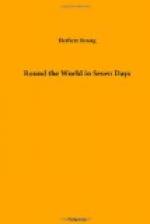“But I shouldn’t undertake it unless we discover that the course is clear. I don’t believe these natives ever keep watch by night; we have seen no sign of them at night since they tried to burn us. The chief difficulty is that we don’t know the exact direction of their camp, but why shouldn’t I go out to-night and locate it?”
“Very dangerous, my boy.”
“There’s danger anyway,” replied Tom, with a shrug. “I should take my pocket compass; two or three of those insects would be enough to light it.”
“I think we had better remain all together, Tom. Help may yet come. Why should you imperil your life, perhaps in vain?”
“Well, Father, I think I ought to chance it. I’ll be careful! if I’m seen I can make a bolt for it; and I fancy I can pick up my heels quicker than the fuzzy-wuzzies, even though they don’t wear boots.”
Dr. Smith was still loth to acquiesce in the proposal, but Tom returned to it more than once during the day, and at last obtained his father’s consent. It was scarcely easier to win over Underhill; but with him Tom cut the matter short.
“You command the men,” he said, with a smile. “My father commands me—in a sense, for I’d have you know I am over age. I’m going to have a try. Get the men ready to make a dash when I come back, for if I succeed the sooner we set about it the better.”
The knowledge of his intended expedition had a wonderful effect on the spirits of the men. Their faces brightened: they threw off the lethargy of despondence which had settled upon them, and discussed with some animation the chances of success.
An hour after nightfall, having first looked and listened for any sign of the enemy, Tom was let out through a gap in the barricade. He caught two or three light-giving insects in the bushes just beyond, and set off in the direction in which the natives had always retreated when their attacks were beaten off.
It was pitch dark in the belt of forest. Night insects hummed around; sometimes Tom heard the rustle made by some small animal as it darted through the undergrowth; there was no other sound. He was able to determine his general direction by means of the compass, but as the forest grew thicker he began to fear that he would find more difficulty than he had anticipated in retracing his course. The damp warm air was oppressive; now and then he struck his head against a low branch, stumbled over a stump or a fallen bough, or found his feet entangled in the meshes of some creeping plant. He was soon bathed in perspiration; every new sound made him jump; and with every stumble he waited and listened with beating heart, wondering if he had betrayed his presence to the enemy. He thought ruefully that his speed as a sprinter would avail him little on ground like this; he had his revolver, but that would be useless against numbers; discovery would mean death.




